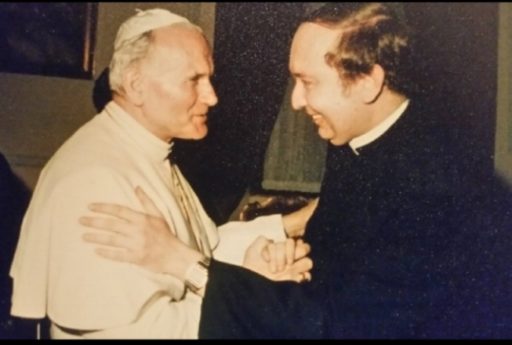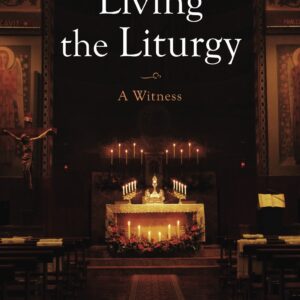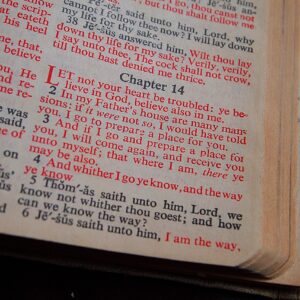On the occasion of the publication of The Relevance of the Stars by the late Monsignor Lorenzo Albacete, we’re reprinting here a memorial tribute by Slant’s editor.
He liked to be called El Santo (Spanish for “the Saint”). In almost anyone else on the planet it would be considered a sort of spiritual vanity or pretension. But in the case of Monsignor Lorenzo Albacete, it was both a joke and a piece of deep theological wisdom.
Come to think of it, just about everything Lorenzo said or did was both a joke and a theological truth.
I think he liked being called El Santo because he was making fun of his own status as a beloved priest and leader in North America of the international lay Catholic movement known as Communion and Liberation. He knew that faces lit up when he entered the room.
But it probably didn’t hurt that another “El Santo” was a wrestler who, in the words of Wikipedia, was “one of the most famous and iconic of all Mexican luchadores.”
Like a luchador, Lorenzo wrestled fiercely—in his case, with life’s deepest questions, including the nature of the human heart, the relationship between reason and emotion, the meaning of suffering, and how to become a free person—the latter being the destiny of every saint.
When Lorenzo died last week at the age of 73, there was an outpouring of love and reminiscence, from the many members of CL who knew him as a companion along the way to representatives of the highest reaches of journalism, academia, and the Church.
Everyone who knew him, even tangentially, had a Lorenzo story. Like the time when he was introduced at the National Prayer Breakfast, for which he was to deliver the opening prayer. As Michael Sean Winters recounts the anecdote, the Protestant minister who introduced him didn’t understand much about the titles given to a Catholic priest and just introduced him using the name of the parish he was then pastoring: “Lorenzo Albacete, the Queen of the Americas.” Lorenzo turned to President Clinton and said: “I have been promoted.”
I have a few stories of my own. Though we had corresponded on and off since the late 1980s, I met him for the first time in 2002. When I arrived at CL headquarters in New York, I encountered a large man with a deep, guttural voice which strongly hinted at his upbringing in Puerto Rico. We talked for hours about Walker Percy, Flannery O’Connor, and more. Eventually, we got hungry and ordered in. I can still see him sitting at the conference table, with a cheeseburger in one hand and a cigarette in the other, ketchup and mustard dripping on his clericals—a large man, as I said, but also somehow puckish at the same time.
Once, when I was present at a CL gathering in Italy, Lorenzo said the final Mass. At the end, when he was supposed to intone “The Mass is ended, go in peace,” he actually said: “The Mass in ended. Byyyeeee!”
Lorenzo cornered the market when it came to reverent irreverence.
Later on, when I would see him at various events, his instant reaction upon my entering the room would be to put his head in his hands and groan (in that deep, guttural fashion) “Oh. My. God.”
I knew him well enough at that point to sense that this expression was at once a gentle ribbing of my self-importance…and a genuine sign of affection.
Trained as an astrophysicist, Lorenzo was equally at home in the sciences and the humanities. He wrote for the New York Times and the New Yorker and was a frequent commentator on CNN and the PBS program Frontline. His comments on the papacy of John Paul II and especially on 9/11 (he lived in New York City and environs much of his life) were profoundly meaningful to many.
When asked if in the face of 9/11 he was comforted by his faith, he answered: “No, no. A thousand times no…. To me, to distract one from this, to look for [political, sociological] explanations, is obscene.” This honesty in front of his own human experience was in fact the origin of his religious sense. He believed we all ought to practice what he called “attentive worldliness.”
But he was an incarnationalist, not a pantheist. He once wrote (in his aptly named book God at the Ritz): “This is what our hearts really want: a God who is intimate while remaining really God.” The way we experience this is through prayer: “Prayer is daring to present our face to the Mystery, to speak to it as a ‘you.’”
This phrase, “the religious sense,” he found in the life and writings of another Catholic priest, an Italian named Luigi Giussani, the founder of Communion and Liberation. For me, perhaps the most amazing thing about Lorenzo was the story of his meeting Giussani and joining the movement.
When that encounter took place Lorenzo was already an important, behind-the-scenes figure in the American church, an advisor and assistant to high-level prelates. When a Polish cardinal came to visit Washington, DC in the late 1970s, the assignment to show him around was given to Lorenzo. The two of them hit it off and became fast friends. The Pole was named Karol Wojtyla.
But when he met Giussani, Lorenzo’s life was changed forever—and yet not changed at all. He felt that he had met someone whose charism, or spiritual gift, had intuited, at a deeper level, his own inmost spiritual instincts.
Giussani believed that religious faith was too often reduced from an encounter with a Presence to what he called “moralism.” Lorenzo would put the contrast this way: “By force of will we accomplish our successes rather than being drawn out by the beauty and goodness of what is ‘other.’”
Both men were very, very funny. They were funny because they were free.
At his funeral Mass in New York City, Cardinal Sean O’Malley ended his homily by saying what you would expect him to say: “Into thy hands we commend our brother, Lorenzo.”
But then he added, in Lorenzo-like fashion, one more request: “Hold on tight.”
A video exhibit on the life and legacy of Msgr. Lorenzo Albacete, including never-before-seen archival footage, will be featured in the 2021 New York Encounter, February 12-14. The exhibit can be viewed beginning on the evening of February 12 at the Encounter’s website. Interactive Zoom meetings with friends and fans of Msgr. Albacete will take place throughout the weekend. For more information or to register, visit the website.
Gregory Wolfe is the publisher and editor of Slant Books. In 1989 he founded Image—one of America’s leading literary journals. He was also the founding director of the Seattle Pacific University MFA in Creative Writing program. His books include Beauty Will Save the World, Intruding Upon the Timeless, and The Operation of Grace. He is married to the novelist, Suzanne M. Wolfe.





